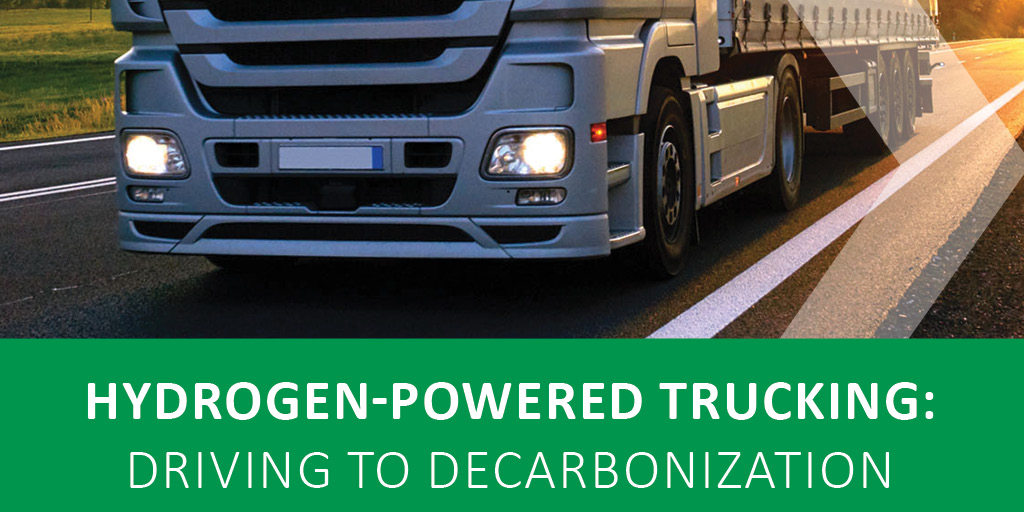There is growing consensus that it will be impossible to meet the emissions targets that countries and corporations around the world are establishing without the transition from diesel and other carbon-based fuels to renewably generated hydrogen.

Eighty percent of global energy demand is currently met by fossil fuels. Electrification is a clear route to decarbonization, but some industries, like long-haul heavy-duty trucking, are especially challenging to electrify. According to the Clean Air Task Force, a nonprofit research and advocacy organization dedicated to reducing atmospheric pollution through research, advocacy, and private sector collaboration:
In the U.S., long-haul heavy-duty trucking accounts for nearly half of the nation’s on-road, carbon-emitting diesel fuel consumption and roughly 13% of U.S. transportation greenhouse gas emissions. Unfortunately, this type of trucking—like marine shipping and aviation—is an end-use case where vehicle weight and energy needs can make it hard to decarbonize with on-board batteries alone.
The task force recently published a first-of-its-kind report comparing the performance of hydrogen fuel cell electric and battery electric drive trains and infrastructure as alternatives to diesel trucking.
The analysis shows that fuel cell electric vehicles (FCEVs) outperform battery electric vehicles (BEVs) in several respects: the number of stops required, total time spent refueling, and available room for cargo. The analysis also finds that FCEV refueling technology has a competitive advantage since it is operationally similar to diesel refueling.
Nuvera is focused on decarbonizing transportation networks with the knowledge that zero-emission operations from medium- and heavy-duty trucks and from on-board auxiliary power units (such as for transportation refrigeration or roadside utility vehicles) mean that work trucks will be able to operate without adversely affecting air quality.
The Clean Air Task Force report identifies several key advantages of hydrogen fuel cell trucks and fueling infrastructure that could help to decarbonize trucking.
Heavy-duty hydrogen trucks have reduced refueling time and fewer stops, resulting in higher efficiency and less downtime. The performance of battery electric and hydrogen fuel cell trucks and infrastructure as alternatives to diesel trucking on a popular long-haul route in the U.S. was simulated. In the study, the fuel cell truck required five less stops and spent less time refueling during the trip than the battery truck did.
The increased cargo capacity of heavy-duty hydrogen trucks provides more room for transporting goods Another key advantage of the fuel cell truck is that it can carry more cargo, because the battery required by the battery electric truck (approximately 1000 kWh) causes a 4,000–20,000-pound loss in cargo capacity. Lost cargo capacity has a significant effect on fleet operations and profitability.
Developing fueling infrastructure for heavy-duty hydrogen trucks may be easier and more cost-effective compared to traditional fueling infrastructure The task force found that building charging infrastructure for BEVs would likely require a larger number or much bigger stations to meet demand, while hydrogen infrastructure has the comparative advantage of being more similar in size and number of stations.
The task force’s conclusion?
Taking advantage of the merits of hydrogen fuel cell vehicles is likely the best way to quickly and efficiently decarbonize long-haul heavy-duty trucking.
Hydrogen fuel cell vehicles afford long travel range and fast refueling, without the compromise required by battery vehicle range limitations and charging times. Light-, medium-, and heavy-duty FCEVs can all be powered by Nuvera® fuel cell engines, and hydrogen can be used for many types of goods movement platforms, including long-haul trucks.
Check out the full report, Zero Emission Long-Haul Heavy-Duty Trucking, for a detailed description of research methods and findings.
In these weeks following Earth Day, we’re reflecting on the myriad ways hydrogen can make our planet a cleaner, better place to live. At Nuvera, we’re committed to making hydrogen applications a reality for trucking and other industries, especially as more companies publicly declare their commitment to reduce transportation emissions from freight operations, establish aggressive zero-emission goals, and decarbonize their transportation networks.
